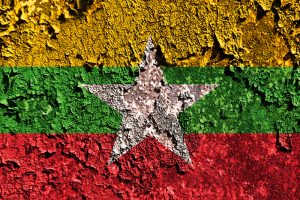Four Western governments have announced the imposition of a series of coordinated sanctions against Myanmar’s military government, ahead of the second anniversary of its seizure of power. The moves by the United States, United Kingdom, Canada, and Australia incrementally tightened the economic noose around the military, which has committed severe atrocities since taking power on February 1, 2021.
In a statement yesterday evening, the U.S. Department of Treasury’s Office of Foreign Assets Control (OFAC)announced that it had added three entities and six individuals to its sanctions list. These include the Union Election Commission (UEC) and two military-linked mining enterprises and their executives, and current and former members of the military.
“The U.S. Department of the Treasury, along with partner nations like the United Kingdom, Canada, and Australia continue to stand with the people of Burma as they seek freedom and democracy,” Brian Nelson, the department’s undersecretary for terrorism and financial intelligence, said in the statement.
“The United States will continue to promote accountability for those who provide financial and material support to, and directly enable, the violent suppression of democracy in Burma.”
A couple of aspects of the announcement were noteworthy. First, the designation of the UEC is a clear signal of U.S. disapproval of the military junta’s plans and efforts to host elections, which coup leader Senior Gen. Min Aung Hlaing has described as a step toward the creation of a “genuine, discipline-flourishing multiparty democratic system.” In reality, the elections are designed to launder the military takeover into a less direct, and for some nations more palatable form of control.
Myanmar’s military administration has begun a pre-election census, and has enacted a new law on the registration of political parties that will make it difficult for opposition groups to mount a serious challenge to army-backed candidates.
The second notable development was OFAC’s decision to add to its blacklist the director and managing director of the Myanma Oil and Gas Enterprise (MOGE), a state enterprise which, according to a United Nations human rights expert, “represents the single largest source of revenue” to the Myanmar state.
In an analysis of the Treasury’s move, the US-ASEAN Business Council described the listing of the MOGE leadership as “an interesting and noteworthy development.” For years, activists have called for Western governments to impose sanctions on MOGE, demands that have grown more urgent and insistent since the 2021 coup. While the European Union imposed limited sanctions on the enterprise, things are trickier for the United States, given the fact that sanctions would likely entangle companies in Thailand, a U.S. treaty ally, which is reliant on gas exports from Myanmar for electricity generation. As it stands, the designation of its senior managers is a way of splitting the difference somewhat, even though, as the US-ASEAN Business Council notes, the designation “only applies to the private individual interests of these persons,” rather than to MOGE as a whole.
The U.S. designation was accompanied by similar announcements by Canada and the U.K. that sanctioned additional individuals and sought to restrict the Myanmar military’s access to aviation fuel. In a statement, Canada’s government stated that it was listing six individuals on its sanctions list, bringing its total to 95 individuals, and introduced a new prohibition on the “export, sale, supply or shipment of aviation fuel to the Myanmar military regime.”
The U.K. also took steps to restrict the military junta’s supply of aviation fuel, which it has used in a “relentless bombing campaign against innocent people,” as human rights groups have documented in detail. London sanctioned two companies and two individuals, all associated with what is known as the Asia Sun Group, an important supplier of fuel to the Myanmar Air Force.
“Our sanctions are meticulously targeted to deliver maximum impact, reducing the military’s access to finance, fuel, arms, and equipment,” Foreign Secretary James Cleverly said in a statement. “The junta must be held to account for their brutal crackdown on opposition voices, terrorizing air raids, and brazen human rights violations.”
Perhaps most surprisingly, these three nations were also joined by Australia, which today belatedly imposed “first gen” sanctions on 16 members of the military regime, including coup leader Min Aung Hlaing and his deputy Soe Win – moves that were taken by other governments more than 18 months ago. It also imposed targeted financial sanctions on two state enterprises – the Myanmar Economic Public Holdings Ltd and Myanmar Economic Corporation – that are central to the military’s web of economic interests.
Until now, Australia has been cautious about targeting the military junta with sanctions, seemingly out of a desire to secure the release of detained Australian economist Sean Turnell, who was working as an economic advisor to Aung San Suu Kyi and was arrested in the days following the coup. But following Turnell’s release in November, it appears that the way is clear for a move toward a more robust Myanmar policy. In a statement announcing the sanctions, Foreign Minister Penny Wong said that Australia “will continue to closely monitor the regime’s actions” and “will continue to keep our targeted sanctions toward Myanmar under review.”
The symbolism of these conjoined sanctions announcements is important, but as with past waves of targeted measures, their impact is likely to be incremental rather than decisive. While the coordinated announcement of the new measures demonstrated the unity of several “like-minded” advanced Western democracies, it also laid bare the fact that none of Myanmar’s neighbors nor the more progressive Asian governments like Japan and South Korea have adopted such a punitive policy. Meanwhile, the military junta continues to receive succor, both active and indirect, from China and Russia.
That said, the sanctions have value as an expression of civilized standards and norms, Meanwhile, Myanmar’s resistance, despite being deeply frustrated at the cautious international action toward their country’s crisis, will welcome anything that moves the military, however gradually, toward collapse.

































